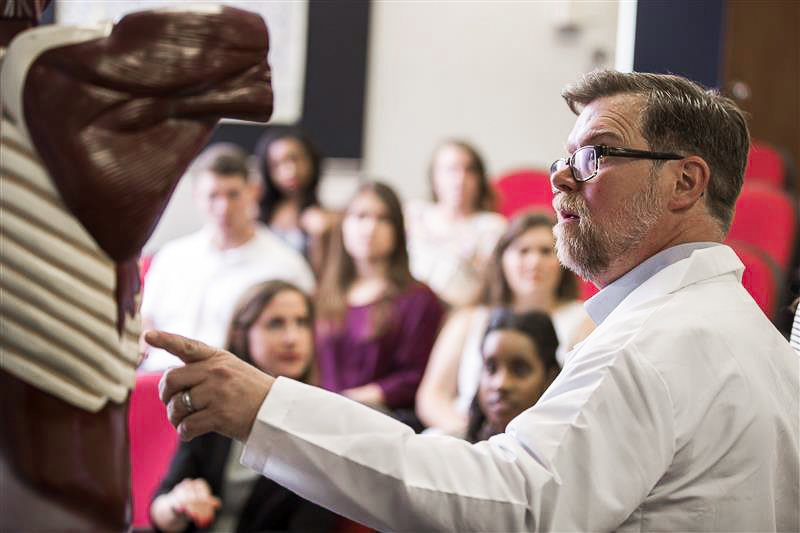7 Reasons Why You Should Get a Psychology Degree

If you're considering studying psychology, you may wonder if it's a good field and what you can do with a psychology degree. You're not alone. Many students enroll in and complete in-person or online psychology degree programs at colleges and universities across the U.S. In fact, psychology ranked as the fifth most popular bachelor's degree among those earned in 2020-21, according to the National Center for Education Statistics.
So, why is psychology so popular? There are many reasons — from understanding people better to developing a diverse set of skills and choosing from a wide range of career disciplines.
As a Christ-centered university, DBU helps undergraduate psychology majors and masters of arts in psychology students understand why it is important for Christians to study psychology and what jobs they can get that serve others.
To help you make an informed decision, here are some reasons you should get a psychology degree.
Reasons to Get a Psychology Degree
To Understand People Better
Psychology is the study of the mind and behavior, according to Psychology Today. Psychologists examine what motivates people and what influences their behavior. They explore how internal influences like genes, temperament, memories, beliefs, and feelings impact people's behavior. They also consider how external factors like relationships, life experiences, and physical surroundings affect behavior.
As you study psychology, you'll gain insight into what makes people behave in specific ways. Understanding people better can enhance personal and professional relationships. This valuable knowledge applies in various work settings and multiple aspects of daily life.
To Develop a Diverse Set of Skills
Psychology blends science with humanities. Therefore, throughout the curriculum for a psychology degree, online or in-person, you'll develop analytical skills as you conduct research and learn psychological theories. You'll evaluate information and deliver evidence-based arguments.
You'll also sharpen soft skills like conflict resolution, empathy, effective communication, and teamwork. Hiring managers identified employees with the latter set of skills as "top performers," in their companies in an Indeed survey. Honing these skills also increases your emotional intelligence, enabling you to work well under pressure, practice mindfulness, and offer support, among other desirable traits.
Earning a psychology degree enables you to bring all these in-demand skills to prospective employers after graduation.
To Make a Positive Difference
Making a positive difference in the lives of others is an invaluable reward for earning a psychology degree. Psychologists, counselors, and therapists help people overcome adversity, improve their mental well-being, and repair family relationships. Devoting your time, energy, and educational training to making this kind of impact is personally and professionally fulfilling.
To Enter a Growing Field
Psychology is a growing field. The U.S. Bureau of Labor Statistics projects that the employment of psychologists will grow 7% from 2023 to 2033. The number of jobs in the field in 2023 was 207,500, and the median annual wage for psychologists was $92,740.1
1Based on data available as of Friday, October 25, 2024, from the Bureau of Labor Statistics, U.S. Department of Labor, Psychologists.
To Choose From Multiple Disciplines and Specialties
One of the best advantages of earning a psychology degree is that students can choose from a wide array of disciplines, specialties, and jobs. Psychologists work in schools, hospitals, and clinics, as well as large corporations like Google, Boeing, and NASA, according to the American Psychological Association.
Mental health awareness and wellness efforts have increased all over the world. As such, there are many psychology specialties and subfields in which psychology degree holders can find jobs, including:
- Brain science and cognitive psychology
- Climate and environmental psychology
- Clinical psychology
- Counseling psychology
- Developmental psychology
- Forensic psychology
- Industrial/organizational psychology
- Rehabilitation psychology
- Sport and performance psychology
You can also focus your studies and career on working with certain age groups like child psychology, teen and adolescent psychology, or geriatric psychology. With so many options, pursuing a psychology specialty allows you to tailor your career goals to match your personal interests.
To Prepare for a Master of Arts in Psychology
Earning your B.A. or B.S. in psychology prepares you to enter graduate school to pursue a Master of Arts in psychology. DBU's master's degree in psychology program prepares graduates as Licensed Psychological Associates (LPA) in Texas. With just two more courses, graduates can train to become a Licensed Specialist in School Psychology (LSSP).
Jobs you can get with a B.A. or B.S. in psychology include:
- Mental health technician
- Sports coach
- Human resources specialist
- Career counselor
- Medical services manager
- Marketing specialist
Jobs you can get with a master's degree in psychology include:
- Social science research assistant
- School psychologist
- Guidance counselor
- Christian guidance counselor
- Marriage and family therapist
- Research analyst
- Postsecondary psychology teacher
These are just a few of the myriad of jobs psychology bachelor's and master's degree holders can get with their versatile degrees.
To Fulfill Your Calling
In keeping with our mission to develop Christian servant leaders, DBU helps students achieve academic success and find and fulfill their calling.
DBU's undergraduate psychology major (BA/BS) equips graduates to help others in various settings. Coursework encourages students to integrate psychology with the teachings of Christianity. The curriculum features courses in the history and systems of psychology as well as research-oriented subjects. Courses include General Psychology, Educational Psychology, Juvenile Delinquency, Drug and Alcohol Problems, Forensic Psychology, and more.
Our Christ-centered psychology degree program also contains an entire course that addresses Christianity and psychology. Feel free to contact DBU with any questions you may have. We are excited to help you reach your education and career goals and follow your calling in Christ.
"Therefore, encourage one another and build each other up, just as in fact you are doing." I Thessalonians 5:11 (NIV)



